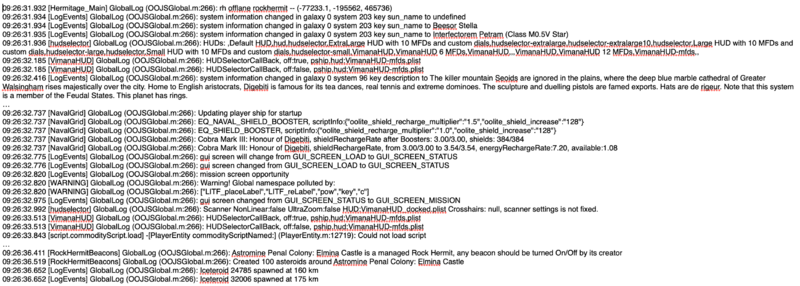Difference between revisions of "Latest.log"
(Updating BB links) |
(Updating BB links) |
||
| Line 28: | Line 28: | ||
== Less information == | == Less information == | ||
| − | See [ | + | See [https://bb.oolite.space/viewtopic.php?p=283232#p283232 these posts] or [https://bb.oolite.space/viewtopic.php?f=4&t=18897 here] for removing "oxp-standards.deprecated" messages (.GNUstepDefaults) |
There is no effect on gameplay with these. | There is no effect on gameplay with these. | ||
Revision as of 13:46, 18 March 2024
While Oolite runs, various diagnostic information is written to a file called Latest.log.
Contents
Overview
The moment you start up your game a latest.log is created (or overwritten) with current information about it (eg. list of OXP's loaded).
At any one time you will have just the one latest.log (your current game or that most recently finished), one previous.log (the previous game) and no information about older games.
If something goes wrong with your game you will often be asked to submit information from your latest.log (which can be incredibly long!).
Location of Latest.log
Where it is depends on your operating system:
- Mac OS X: Restart Oolite, and select “Show Previous Log” from the “Oolite” menu in the menu bar. Alternatively, in the Finder, select “Go to Folder…” from the Go menu, and enter “~/Library/Logs/Oolite/”, and find Latest.log.
- Windows: in Oolite’s folder (typically in C:\Oolite), there is a folder called oolite.app, which contains a folder called Logs. A shortcut to this folder is created at Oolite's Start Menu entries during installation. If you have installed the game in a folder subject to file virtualization like C:\Program Files\Oolite and encounter difficulty in locating the log files, then please refer to the Known Issues section of this FAQ for information on how to access them.
- Linux and other Unix-like systems: ~/.Oolite/Logs (that is, in the hidden folder .Oolite in your home folder). If you’re using Nautilus or Konqueror — if you’ve never heard of them, you probably are — select Show Hidden Files from the View menu.
More information
- LogEvents adds much more information about your game (such as details of battles) to your latest.log (highly recommended!)
- If you are developing an oxp you may find the second of the three varieties of Oolite more useful - the Developer Version - which supports the Debug OXP
- Monitor attacks more detailed than "shipTakingDamage"/"shipBeingAttacked": ie which ship attacked and which shield was impacted. (2017)
- "reportAIMessages" and pretty circles and lines (2012) - note that this predates cim's revamp of the AIs
badWeaponRange
See Strange message in the log file (2017)
Less information
See these posts or here for removing "oxp-standards.deprecated" messages (.GNUstepDefaults)
There is no effect on gameplay with these.
- Examples include "Old style sub-entity declarations are deprecated in ...", "does not use strict", "has no manifest" ... etc.
Fixing things!
- The AppleMac is less forgiving of syntax errors than the Windows operating system. See here for some possible fixes (2018). See a_c's note on using the Expansions Manager to unzip the OXZ's.
- How to tweak OXZ's
